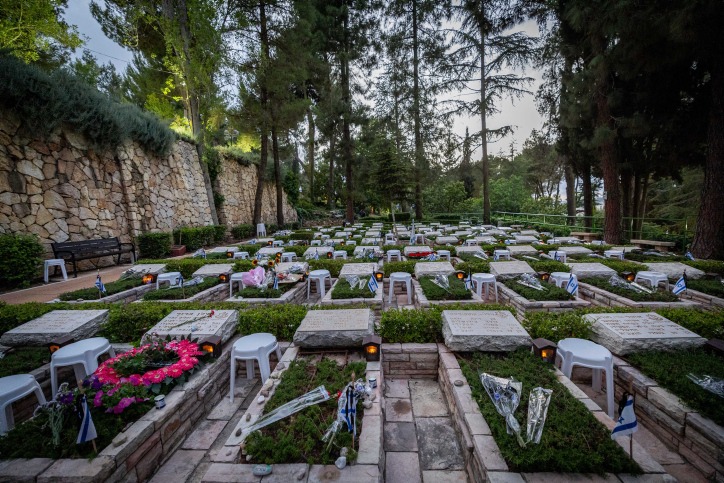
Only after a long struggle spanning many years was the Ministry of Defense forced to recognize a military undertaker as a post-traumatic stress disorder victim, and grant him an especially high benefit.
Was your property damaged in an act of hostilities or war? Here's how to easily file an online claim
The decision in his case was made after a lengthy legal battle, led by attorney Yoav Almagor, who specializes in battles to restore medical rights against the Ministry of Defense.
The plaintiff, born in 1974, a member of a large Haredi family, enlisted in the IDF in 1999 and began permanent service three years after his enlistment.
His role included identifying and collecting casualties in the field, sometimes under heavy fire, treating the bodies, organizing and conducting funerals and memorials, and closely accompanying the bereaved families.
For more than a decade, the plaintiff treated hundreds of victims and witnessed difficult scenes and constant trauma.
Attorney Yoav Almagor, who represents the undertaker, recounts his tragic story as part of an appeal he filed against the Defense Ministry's decision.
According to the lawsuit, for more than a decade, the plaintiff treated hundreds of casualties, event after event, while being exposed to particularly difficult scenes. Among the events he described in his affidavit, the undertaker noted that he took part in the treatment of the APC disaster on the Philadelphia Expressway in 2004, in which he was forced to collect body parts under fire.
In his affidavit, the undertaker describes another chilling case, of a soldier who was found after a suspected suicide, when his body was mutilated by wild animals.
According to him, among other things, he was forced to handle the evacuation of the cemetery in Gush Katif during the disengagement in 2005, an event that, according to him, involved significant mental effort.
During the Second Lebanon War, in 2006, the plaintiff treated approximately 25 fallen soldiers, including soldiers he knew personally, and accompanied their families, whom he knew even before their loved ones died.
In addition, the prosecutor testified that he treated the victims of the Carmel disaster in 2010, the victims of the helicopter crash in Romania that year, and those who fell in operations Pillar of Defense and Protective Edge, the latter of which alone treated approximately 30 casualties in particularly serious condition.
Throughout his years of service, the plaintiff accompanied many families, participating over the years in memorials and family events they held, which significantly worsened the trauma he experienced, due to the ongoing exposure to the families' memories and suffering.
According to the lawsuit, due to his difficult role and ongoing exposure to traumatic events, the plaintiff began to suffer from symptoms of severe post-traumatic stress disorder, including severe nightmares, flashbacks, outbursts of rage, difficulty concentrating, and extreme social and family isolation.
He tried to avoid any trigger that might remind him of the difficult events, but without success, and was forced to deal with serious functional difficulties at home and at work.
In 2013, the plaintiff was discharged from regular service due to cuts, but continued to serve in the reserves. In 2016, after understanding the severity of his condition, the undertaker independently submitted a request to the compensation officer at the Ministry of Defense to recognize him as an IDF disabled person, but after four years, the Ministry of Defense decided to reject his request, claiming that his condition did not amount to PTSD but only expressed a mild anxiety-depressive disorder.
At this point, the plaintiff turned to attorney Yoav Almagor, who filed an appeal on his behalf against the decision of the compensation officer at the Ministry of Defense. The appeal was heard in the Jerusalem Magistrate's Court, before a panel of three members of the appeals committee.
The appeal was accompanied by a detailed opinion from a psychiatric expert who noted that the plaintiff "suffers from severe and prolonged post-traumatic stress disorder due to his long service in identifying and collecting bodies and body parts, in performing all stages of military funerals, including purification, accompanying the families for final identification and farewell to the fallen, and continuing contact with a significant portion of the grieving families."
The expert also criticized the IDF in his opinion, noting that "the plaintiff's ongoing contact with the bereaved families is contrary to the IDF's victim theory, and leads to ongoing secondary traumatization."
The appeals committee, impressed by the plaintiff's testimony and the expert's opinion, accepted the appeal and ordered the Ministry of Defense to recognize the plaintiff as a disabled person suffering from severe post-traumatic stress disorder.
Due to the court's decision, the Ministry of Defense's medical committee convened and determined that the plaintiff had a disability level of 50%, an extremely high level that reflects the severity of his condition.
The committee noted that the plaintiff lives in a state of constant distress, suffering from constant nightmares, intrusive memories, severe reactions to sights and smells that remind him of the horrors he experienced, and severe difficulties in daily, family, and social functioning.
Attorney Almagor: "This is an important decision, which has far-reaching implications for combat supporters and undertakers who are involved in identifying and burying fallen soldiers and are at high risk of ongoing post-trauma. Recognizing the severe mental harm experienced by the plaintiff will help him and many others in his situation receive the treatment and support they need."